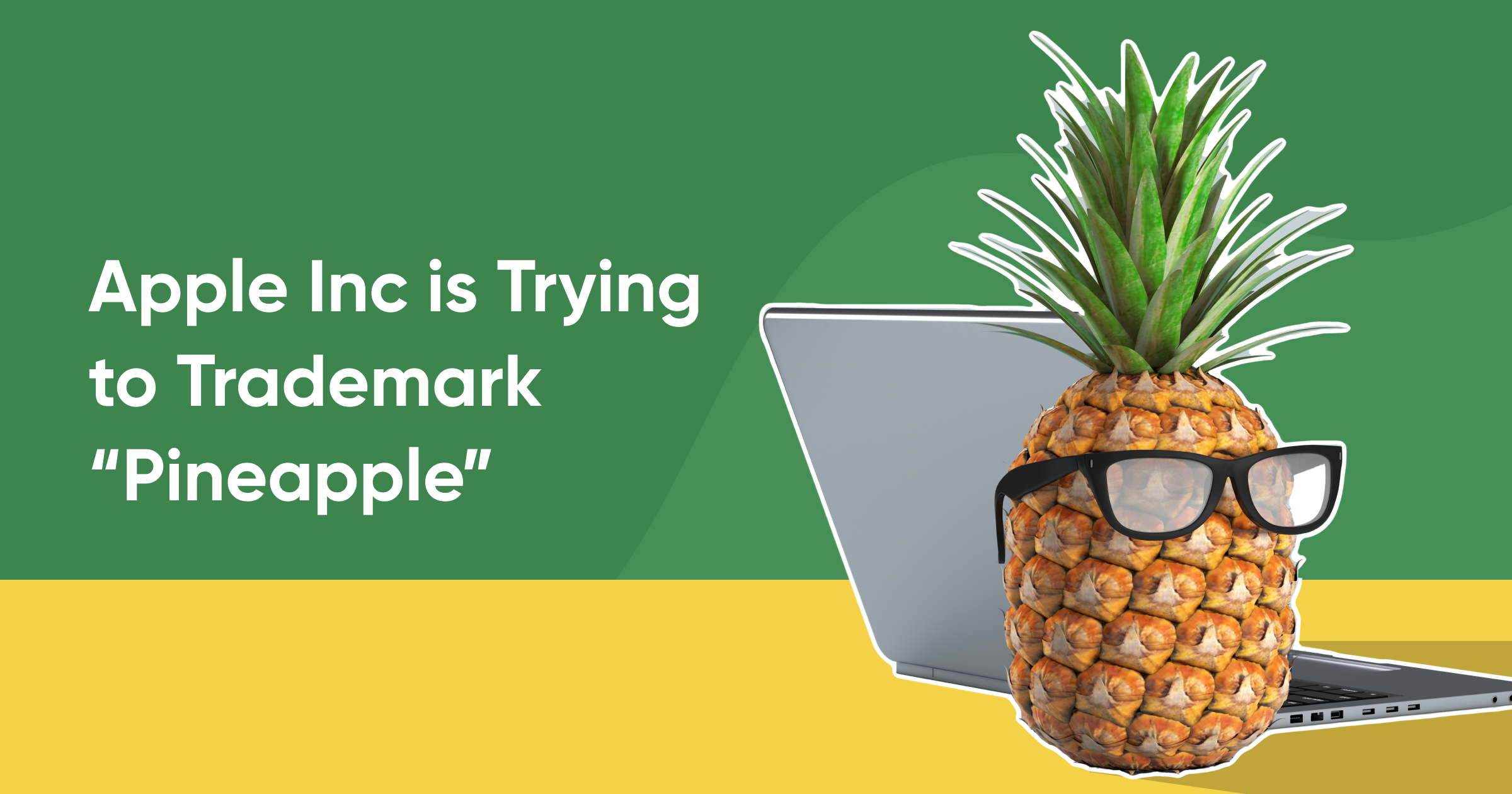Amrusha Chati
25 August 2023 • 4 min read

Apple Inc. is famous worldwide for its technology and popular products like iPhones, iPads, and MacBook laptops. But it's also infamous for being one of the biggest trademark bullies in the world. It's been known to spar with other apples before, but now it's gunning for a whole different fruit. Apple Inc is trying to trademark “Pineapple.”
And this appears to be the latest in Apple's fruit frenzy when it comes to trademarks. At first glance, it all seems a bit comical. One of the biggest names in big tech sending an army of lawyers after anyone who applies for a fruit trademark. But this really does seem to be happening. And for small business owners and independent creators, it's no laughing matter.
Let's take a closer look at the strategy behind Apple's trademark bullying.
The US Patent and Trademark Office (USPTO) defines a trademark bully as “a trademark owner that uses its trademark rights to harass and intimidate another business beyond what the law might be reasonably interpreted to allow.”
Over the last few years, Apple has earned itself the reputation of being a major trademark bully.
A study by the Transparency Project (TTP) found that:
"Over a three-year period (2019-21), Apple filed 215 trademark oppositions, more than Amazon, Google, Microsoft, and Facebook combined (136)."
The company routinely opposes small businesses whose logo has any connection to an apple, even if it's farfetched. Apparently, these voluminous notices of opposition are meant to avoid “potential trademark infringement.”
A $2.5 trillion company like Apple obviously has very deep pockets. With its considerable might and extensive legal machinery, Apple has previously gone after small businesses like:
This is just to name a few.
And it's not just the little guys. The Fruit Union Suisse is being forced to rethink its logo. For most of its 111-year history of promoting the interests of Swiss fruit producers, its logo has been a red apple with a white cross (like the Swiss flag). But Apple is trying to claim IP rights on all depictions of the actual apple fruit.
In fact, the company was even entangled in a battle with the Beatles' music label, Apple Corps, for 30 years.
The Beatles could afford to fight Apple Inc., but most small businesses can't.
So, what's the rationale for this strategy? Why spend all this time and effort in opposing all depictions of a very common fruit across the world?
The answer may lie in the world's most valuable apple.
Today, almost every single person across the world can recognize the iconic apple with a bite taken from it. Apple Inc.'s products are universally perceived as high-tech, aspirational, and premium products. And the Apple logo is an extricable part of this brand identity.
In 2023, Apple's brand was valued at $880.5 billion. And that's after a 7% drop from its record high of $947 billion in the previous year. This makes it the most valuable brand in the entire world, ahead of giants like Amazon, Google, and Microsoft.
This immense value sheds some light on Apple's trademark aggression.
A Notice of Opposition submitted by Apple Inc to the Trademark Trial and Appeal Board (TTAB) claims that "Apple's family of Apple Marks are distinctive, arbitrary, and fanciful marks that have achieved an extraordinary level of fame and consumer recognition."
This fame and recognition seems to be what is driving Apple Inc. in its fruity quest for trademarks. It has now begun an attempted trademark registration for "pineapple." While this is the first time it has done this, it's not the first time Apple's been possessive about pineapple.
In 2020, the company filed an opposition against singer-songwriter Stephanie Carlisi for an application to trademark her stage name, Franki Pineapple.
“My initial reaction to Apple opposing my trademark was utter shock. I was blindsided. Of all the entities I thought may contest my application, Apple Inc. was the furthest from my concern or even my attorney’s” Franki told Trademarkia.
So why did Apple go after her trademark? Apple claims that its marks are "so famous and instantly recognizable" in music through Apple Music, iTunes “that the similarities in Applicant's Marks will overshadow any minor differences and cause consumers to believe that Applicant is related to, affiliated with, or endorsed by Apple.”
Apple added, “While the words 'apple' and 'pineapple' do not have the same meaning, they are both the names of fruits and thus convey a similar commercial impression.”
Franki disagrees. “I do not think Apple’s objection was justified”, she says, adding that “I find it hard to believe any reasonable person would confuse ‘Franki Pineapple’ with Apple Inc.”
Eventually, she agreed to settle. She says, “I didn’t want to jeopardize the use of my trademark by continuing to fight. The lawsuit had stressed me out for eight months during the height of the 2020 pandemic. The ordeal had traumatized me and I wanted to move past it to focus on my art.”
Luckily for her, it came at a relatively small price. “I was so relieved when my attorney told me we’d beat the largest company in the world. If I added my legal name, Stephanie Carlisi, to my description of goods and services and specified ‘Franki Pineapple’ as my stage name, I’d have a registered trademark. After all I’d been through, this seemed a small price to pay, so I accepted.”
Apple had also challenged a trademark application for Pineapple Live, a live music entertainment event company. Pineapple Live eventually withdrew its application in December 2021.
And now Apple seems to be trying to get rights over "pineapple" rather than opposing other, individual trademark applications.
As Apple's products become increasingly aspirational, its brand value continues to soar. That means the company might even double down on protecting its precious logo.
And this strategy quietly runs contrary to its consumer-facing image.
Franki Pineapple says, “Apple’s strategy of bullying independent artists and small businesses into giving up their trademarks is hypocritical. Apple Inc. produces some of the most cutting-edge tools in the world for entrepreneurs to bring their creative visions to fruition. It is disappointing to witness this beloved company bully the very people they empower. They encourage people to “think different” with the use of their products and technology, but intimidate anyone viewed as a threat to their market domination, regardless of how virtually non-existent, even impossible, that threat may be.”
While trademark bullying is considered unethical at large, a tech giant like Apple will probably prefer this notoriety to diluting its brand in any way.
This means that we'll likely see more such instances of Apple Inc. going after anything and everything that bears even the slightest similarity to its logo. And given that it's one of the biggest technology businesses in the world, its efforts might sometimes bear fruit.
AUTHOR
Amrusha is a versatile professional with over 12 years of experience in journalism, broadcast news production, and media consulting. Her impressive career includes collaborating extensively with prominent global enterprises. She garnered recognition for her exceptional work in producing acclaimed shows for Bloomberg, a renowned business news network. Notably, these shows have been incorporated into the esteemed curriculum of Harvard Business School. Amrusha's expertise also encompassed a 4-year tenure as a consultant at Omidyar Network, a leading global impact investing firm. In addition, she played a pivotal role in the launch and content strategy management of the startup Live History India.
Related Blogs

Do Trademarks Expire? (+ How to Renew Yo...
10 May 2024 • 7 min read

Are Wargs Copyrighted? (+ Can You Copyri...
09 May 2024 • 4 min read

How Much Does a Trademark Attorney Cost?...
07 May 2024 • 6 min read

Is Filing a Trademark Hard? (+ How to Ma...
03 May 2024 • 7 min read

What Is the Most Common Reason That a Tr...
03 May 2024 • 6 min read